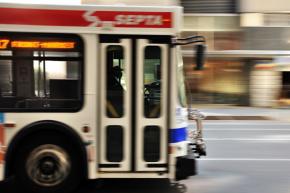Standing up to SEPTA
looks at the issues at stake for Philadelphia-area transit workers.
AS THE expiration of their current contract nears, subway, bus and trolley workers for the City Division of the Southeastern Public Transportation Authority (SEPTA) are preparing for a strike. The contract expires at midnight on March 14 for the 4,713 members of Transport Workers Union (TWU) Local 234.
SEPTA's management proposes to end the defined pension plan immediately and replace all future pension contributions with a 401(k)-type plan. Currently, according to the union, the defined-benefit pension pays $2,500 a month after 30 years of service.
However, as the union explained in its newsletter, under SEPTA's plan, managers would:
continue to receive an uncapped monthly pension benefit, based on the full amount of their annual earnings, along with a 10 percent match on their contributions to a 401(k)-type plan! The union will never agree to any such reduction in pension benefits...Instead, Local 234 is determined to raise the monthly pension benefit for future retirees.
SEPTA's other proposals include cutting retiree health care coverage; having current employees pay for all increases in the cost of health care; eliminating two paid holidays; and cutting vacation and travel allowances. TWU President Willie Brown reportedly told SEPTA at the bargaining table that the Authority's chances of getting such concessions from TWU workers are "as likely as a fish drowning."
According to the Philadelphia Inquirer, an immediate strike by Philadelphia bus drivers, subway and trolley operators and maintenance workers seems unlikely. So far, TWU members have not taken a strike vote--suggesting that if there is to be a walkout, it would not occur until April, when other contracts TWU and transit contracts expire.
THE OUTCOME of contract negotiations with the City Division will set an important benchmark for other SEPTA labor contracts expiring next month. As the Inquirer reported:
Separate contracts expire next month with TWU 234, Suburban Transit Division, Victory District, which represents about 160 suburban maintenance and clerical employees, and TWU Local 234, Suburban Transit Division, Frontier District, which represents about 230 bus drivers and mechanics in Montgomery and Bucks Counties.
Also expiring in April is a contract with members of United Transportation Union Local 1594, Suburban Transit Division, Victory District, which represents about 360 operators on the Media/Sharon Hill trolley lines and conductors and operators on the Norristown High Speed Line...
Typically, any agreement reached by TWU 234 for its city workers sets the pattern for SEPTA's other 16 labor contracts.
In theory, according to TWU, "if negotiations fail, the unions representing SEPTA workers may all be on strike at the same time, idling bus, trolley, train and regional rail service for the first time ever."
City Division transit workers have struck seven times since 1977. The current contract was signed in 2009 after a six-day strike that began right after the end of the World Series.
In 1983, the commuter railroad division was shut down for 108 days by the railroad unions in response to SEPTA's demands for drastic cuts in pay and changes in working conditions. The members of more than a dozen craft unions returned to work in defeat. This year, however, representatives of railroad unions are meeting with the TWU to find ways to show solidarity in the case of a strike. Under the terms of the Federal Railway Labor Act of 1926, it would be illegal for them to walk out.
Local media have taken a condescending attitude toward the union, with headlines like "Three ways Willie Brown can make the public less angry about the coming SEPTA strike" and "Dear SEPTA union: This is your last stop." Typical are complaints that the working public will suffer most during a transit strike--and that's who pays the salaries and benefits of TWU workers.
But if a strike is coming, it's the fault of SEPTA management, not the union workers, who are hardly overpaid. Base salary for new SEPTA bus drivers is just $33,887 a year--a far cry from the $202,000 yearly salary that SEPTA General Manager Joseph M. Casey began making when he took over SEPTA's top spot in 2008.
In early March, TWU Local 234 reported:
SEPTA management is both hostile to the concerns of our members and seems incapable or working constructively to negotiate over contract issues important to our members. SEPTA management's philosophy is that it's "our way or the highway." This does not bode well for negotiating a new contract on schedule and without a strike.
SEPTA workers are the ones that make Philadelphia run--and they deserve a living wage, decent benefits and jobs with dignity.



